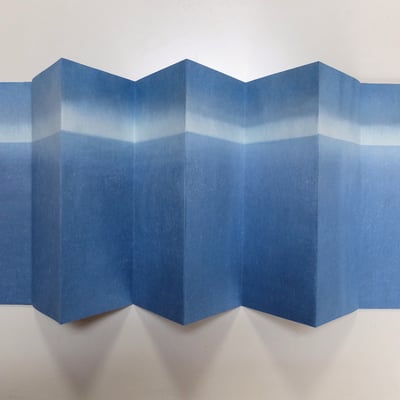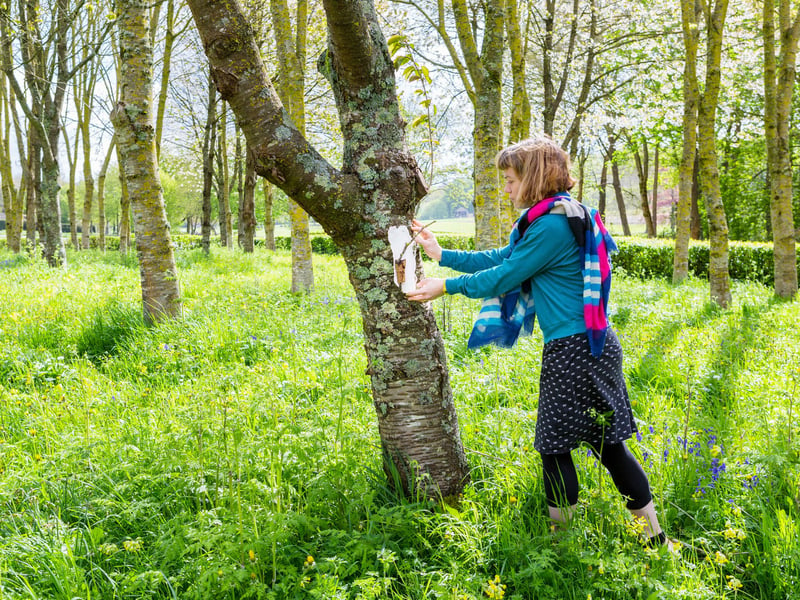Lucy May Schofield
Lucy is a graduate of the London College of Printing with 17 years of experience as a tutor. She has studied printmaking, bookbinding and paper-making with Japanese master craftspeople.
Ref: D3D37816
This three-day workshop invites you to learn the traditional Japanese art of scroll making, a beautiful combination of washi (mulberry paper), nori (rice paste) and cloth. A kansubon (hand scroll) is a book in its most elementary form, consisting of a number of sheets of paper joined in sequence, attached to a wooden dowel at one end and with a cloth-bound outer cover. Traditionally used for Buddhist sutras and picture books, it has the potential to be applied to contemporary book arts projects today to combine various printed media within a captivating book form.
Over three days, you will learn the techniques of backing silk and linen cloths with lightweight washi paper to create book cloth using the urauchi method, alongside the skills to attach sections of paper together to create seamless pages stretching on for metres and bound with silk ribbon.
The materials used for the scroll are all sourced from Japan and the UK. You can expect to leave the workshop with a beautiful cloth-bound scroll with lacquered wooden ends containing several metres of mulberry paper pages. You will gain the confidence to create your own book cloths and scroll structures in the future.
This course is ideally suited to those with some book making experience, however, all the related techniques will be covered in the instruction. The course is for anyone interested in working with the book form using sustainable/reversible materials and who wishes to practise the skills needed to construct scroll works.
On this course the tutor will supply most of the materials, including: Washi paper, patterned papers, fabrics, bone folders, bone and acrylic clasps, silk ribbon, nori paste, newsprint.
Please bring any bookbinding tools you may have, such as sharp pencils, a sharpener, eraser and a notebook to take notes.
Available from tutor: Washi paper will be available to purchase from the tutor to use for future projects.
Please wear appropriate clothing/aprons for the workshop or studio, this includes stout covered footwear (no sandals or open toes).
Student registration: 10.30am - 11am
Course teaching: 11am – 5.15pm
Morning session: 11am - 1pm
Lunch break: 1pm - 2pm (lunch is not included)
Afternoon session: 2pm - 5.15pm (15 minute break, 3.30pm–3.45pm)
Teaching finishes: 5.15pm
Short courses are open to anyone aged 18 and over. The course fee covers tuition and materials where stated. You will need to bring all other items listed under the ‘Materials to bring’ section.
Coffee and tea are included in the course fee, but you will need to bring lunch with you to eat in the refreshments room. There are also plenty of other local venues to purchase food.
If you have any specific access needs, we will need to know about your access requirements in advance. Please tell us about your needs in confidence by emailing: [email protected] This venue has steps to the front reception, with limited access via a side gate to the ground floor. There is a small lift to higher floors or stairs.
Short course students are required to sign a safety compliance form as part of West Dean Health and Safety regulations.
Please refer to our terms & conditions below.
The information given is accurate at the time of publication. However, West Dean College reserves the right to cancel or amend courses if circumstances require.

Lucy is a graduate of the London College of Printing with 17 years of experience as a tutor. She has studied printmaking, bookbinding and paper-making with Japanese master craftspeople.

Take the next step in your creative practice, with foundation level to Masters in Fine Art study.
Depending on your experience, start with an Online Foundation Certificate in Art and Design (one year, part-time), a Foundation Diploma in Art and Design made up of 10 short courses taken over two years (part-time) or advance your learning with our BA (Hons) Art and Contemporary Craft: Materials, Making, and Place (six years part-time). All will help you develop core skills, find direction in your practice and build an impressive portfolio in preparation for artist opportunities or higher-level study. See all degree and diploma courses.